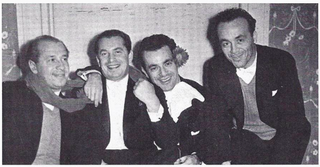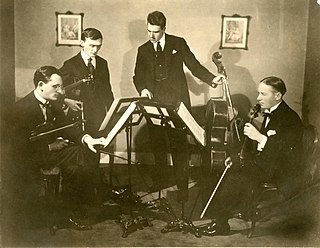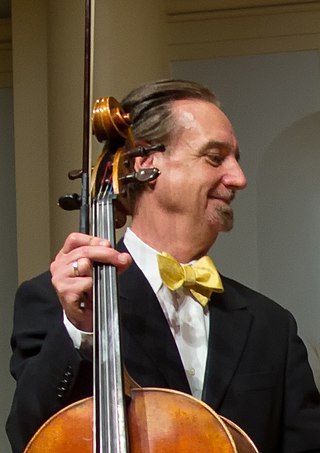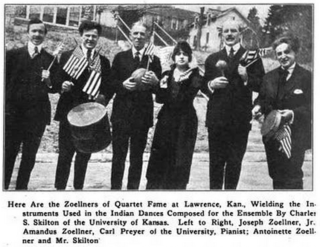
The Flonzaley Quartet was a string quartet organized in Manhattan, New York City, in 1902. The group disbanded in 1929. [1] [2]

The Flonzaley Quartet was a string quartet organized in Manhattan, New York City, in 1902. The group disbanded in 1929. [1] [2]
The personnel of the group were as follows:
Violinist Frank Howell Holden frequently played with the group. [3]
The quartet was the creation of Edward J. de Coppet of New York, who in 1903 engaged the original members to devote themselves entirely to quartet-playing, and not with any view to giving regular concerts in public. [4] [5] The group took its name from de Coppet's summer villa near Lausanne, in Switzerland, where the four musicians first rehearsed. After a long period of practice, the Quartet made a European tour and won high praise for the perfection of its ensemble and its artistic finish. Both violinists and the violist had been students of the Belgian maestro César Thomson, who would also teach members of a contemporaneous pioneering American chamber group, the Zoellner Quartet. [6] The group was first heard in New York, in private and at charity concerts, in autumn 1904, but it did not give a public concert in the United States until 5 December 1905. After that it appeared regularly in Europe and America. The members stuck to the original principle of not accepting any outside engagement, and having no pupils, and by devoting themselves entirely to the quartet maintained a position of acknowledged superiority in their field.
In 1914 the group asked Igor Stravinsky to write them a work. This resulted in his "Three pieces for String Quartet". A few years later they also commissioned him to write "Concertino", a one-movement work. Éduard de Coppet died in 1916, and his son André continued thereafter to maintain the Quartet. The original violist Ugo Ara left the group to join the Italian army, resulting in his replacement. The Quartet performed worldwide until disbanding in 1929.
One of their final public concerts was at The Town Hall in Manhattan, New York City, on March 17, 1929. They broadcast their farewell concert over station WEAF (now WFAN) on May 7, 1929. [1]
Their recording of the Haydn 'Lark' quartet (below) could still be described as 'in prep.' in 1936.
From 1913 until 1929, The Flonzaley made several acoustic and electrical recordings for the Victor Talking Machine Company. Among their recordings of longer works are the following:
The Aeolian Quartet was a highly reputed string quartet based in London, England, with a long international touring history and presence, an important recording and broadcasting profile. It was the successor of the pre-World War II Stratton Quartet. The quartet adopted its new name in 1944 and disbanded in 1981.
The Takács Quartet is a string quartet founded in Budapest, Hungary, and now based in Boulder, Colorado, United States.

The Emerson String Quartet, also known as the Emerson Quartet, was an American string quartet initially formed as a student group at the Juilliard School in 1976. It was named for American poet and philosopher Ralph Waldo Emerson and began touring professionally in 1976. The ensemble taught in residence at The Hartt School in the 1980s and is currently the quartet in residence at Stony Brook University. Both of the founding violinists studied with Oscar Shumsky at Juilliard, and the two alternated as first and second violinists for the group. The Emerson Quartet was one of the first such ensembles with the two violinists alternating chairs.

The Melos Quartet was a much-recorded, Stuttgart-based string quartet active from 1965 until 2005, when its first violinist died. It also went by the name Melos Quartett Stuttgart, partly to distinguish itself from the equally prominent chamber group the Melos Ensemble of London.

The Budapest String Quartet was a string quartet in existence from 1917 to 1967. It originally consisted of three Hungarians and a Dutchman; at the end, the quartet consisted of four Russians. A number of recordings were made for HMV/Victor through 1938; from 1940 through 1967 it recorded for Columbia Records. Additionally, several of the Quartet's live performances were recorded, at the Library of Congress and other venues.

The Fine Arts Quartet is a chamber music ensemble founded in Chicago, United States in 1946 by Leonard Sorkin and George Sopkin. The Quartet has recorded over 200 works and has toured internationally for 78 years, making it one of the longest enduring major string quartets. In its history, the Quartet has had two leaders: Leonard Sorkin, from 1946 to 1981, and Ralph Evans, from 1982 to the present. Its current members are violinists Ralph Evans and Efim Boico, violist Gil Sharon, and cellist Niklas Schmidt.
The Hollywood String Quartet (HSQ) was an American string quartet founded by violinist/conductor Felix Slatkin and his wife cellist Eleanor Aller. The Hollywood String Quartet is considered to be the first American-born and trained classical music chamber group to make an international impact, mainly through its landmark recordings. These recordings have long been regarded as among the most outstanding recorded performances of the string quartet repertoire.

The Quartetto Italiano was a string quartet founded in Reggio Emilia in 1945. They made their debut in 1945 in Carpi when all four players were still in their early 20s. They were originally named Nuovo Quartetto Italiano before dropping the "Nuovo" tag in 1951. They are particularly noted for their recording of the complete cycle of Beethoven string quartets, made between 1967 and 1975. The quartet disbanded in 1980.

The London String Quartet was a string quartet founded in London in 1908 which remained one of the leading English chamber groups into the 1930s, and made several well-known recordings.
The Pro Arte String Quartet is a string quartet founded in Belgium, which became affiliated with the University of Wisconsin-Madison in 1941.
The Hungarian String Quartet was a musical ensemble of world renown, particularly famous for its performances of quartets by Beethoven and Bartók. The quartet was founded in Budapest in 1935 and was disbanded in 1972.

The Amar Quartet, also known as the Amar-Hindemith Quartet, was a musical ensemble founded by the composer Paul Hindemith in 1921 in Germany. The quartet was active in both classical and modern repertoire until disbanding in 1933. It performed for many European concerts, broadcasts and recordings.
The Spencer Dyke Quartet was a string quartet active in England through the 1920s. It was formed in 1918 and its personnel remained unchanged until August 1927 when Bernard Shore became the violist and Tate Gilder the second violin. It is best remembered now for a series of pioneering chamber music recordings made for the National Gramophonic Society. At the time of the recordings, the Quartet members were Edwin Spencer Dyke, Edwin Quaife, Ernest Tomlinson (viola) and Bertie Patterson Parker cello. Bernard Shore played viola in the last two recordings only.
The New Hungarian Quartet was a string quartet founded by Andor Toth in 1972 at Oberlin Conservatory of Music, where members were on the faculty. It is separate from the well-known Hungarian Quartet, though the violist in both groups was the same. From 1975 until 1979 the quartet was the first faculty quartet-in-residence at the Taos School of Music in Taos, New Mexico.
The Tátrai Quartet was a Hungarian classical string quartet founded in 1946. For the half-century after World War II it was one of the foremost string quartets in Hungary, specializing in Haydn and Bartók, whose complete quartets it recorded for Hungaroton, Mozart and Beethoven as well, and were also responsible for first performances of works by certain Hungarian composers.
The Yale Quartet was a string quartet based at Yale University composed of musicians in the Yale School of Music and formed and led by violinist Broadus Erle from the time he arrived at Yale in 1960. The Yale Quartet is especially acclaimed for their classic recordings of the Beethoven late string quartets, made for the Vanguard label during the late 1960s and early 1970s. Violist David Schwartz, who began with the quartet, was later replaced by renowned violist Walter Trampler. Original 2nd Violinist Yoko Matsuda was succeeded by Syoko Aki in 1967; Aki still teaches at Yale, having joined the faculty in 1968 and violoncellist Aldo Parisot retired from Yale in 2018 at the age of 99, following a 60-year tenure there; he died in December 2018, shortly after his 100th birthday. After Broadus Erle's premature death in 1977, the Yale Quartet disbanded. The Tokyo Quartet was the quartet-in-residence at Yale for most of the period since the late 1970s, until the Brentano String Quartet was appointed to the position in 2013. The Yale's celebrated recordings of Beethoven's last five quartets and Grosse Fuge for Vanguard have been reissued on compact disc, as have their only other recordings, of two Mozart quartets, K.421 and K.575, and the Brahms piano quintet with André Previn.

David Finckel is an American cellist and influential figure in the classical music world. The cellist for the Emerson String Quartet from 1979 to 2013, Finckel is currently the co-artistic director of the Chamber Music Society of Lincoln Center in New York, co-founder of the independent record label ArtistLed, co-artistic director and co-founder of Music@Menlo in Silicon Valley, producer of Cello Talks, professor of cello at The Juilliard School, and visiting professor of music at Stony Brook University.

The Zoellner Quartet was a string quartet active during the first quarter of the 20th century. It was once described as "the most celebrated musical organization in the West which devotes its energies exclusively to the highest class of chamber music". After training in Europe, the group toured widely throughout the United States in its prime years. Although all members were natives of Brooklyn, New York, the ensemble formed a strong early association with Belgium and in publicity often billed itself as "The Zoellner Quartet of Brussels"; its ultimate base of operations was in California. With one brief interruption at the end of World War I, the membership remained constant throughout the quartet's existence: Joseph Zoellner and his children Antoinette; Amandus; and Joseph, Jr. A second "Zoellner Quartet" was later formed by Joseph, Jr. and three unrelated musicians.
The Busch Quartet was a string quartet founded by Adolf Busch in 1919 that was particularly noted for its interpretations of the Classical and Romantic quartet repertoire. The group's recordings of Beethoven's Late String Quartets are especially revered.

Louis Bailly was a French-Canadian violist and music educator. He was born on 18 June 1882 in Valenciennes, France and died on 21 November 1974 in Cowansville, Quebec.